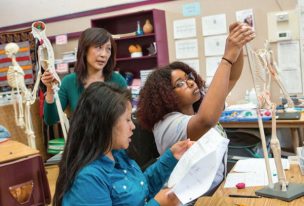What Makes Mills Teacher Scholars Unique?
When I was a teacher, I sat through countless professional development workshops. The topic varied, but the format was often the same: I would sit with my notebook at hand and scribble notes as an expert told me how to do something–how to teach vocabulary to second language learners, how to support students to engage in academic discussion, how to get students to write analysis. Sometimes I was asked to engage in small activities that mimicked the experiences students would have; other times a presenter would model the new teaching strategy.
I would leave these workshops energized with some new ideas to try in my classroom, yet these notes and workshop handouts would get buried under a pile of essays I had to read or the binder collected dust on a bookshelf. It wasn’t that I didn’t learn anything in these workshops—often the presenters were engaging and the content was thought-provoking. It wasn’t that I didn’t want to improve my practice or felt that I had no room to grow. Quite to the contrary, I attended those workshops because I wanted to find new, better ways to help my students learn. The real barrier was that I didn’t have the time or the thinking space to really dig into these tools as I practiced them and make sense of them in the context of my students’ learning. I usually tried something once or twice, but rarely did any of the “best practices” have lasting power.
A student-centered approach
Teacher-driven inquiry is a different approach to improving practice. The goal is the same– to improve  teaching to support student learning; the difference is really in the journey. Instead of solutions driving the work, inquiry starts with uncertainty and wondering. Teachers focus in on a particular instructional routine and ask themselves questions: “What are my students able to do?” “What does success look like for these students in my classrooms?” “What is getting in the way of my students’ learning?” When Mills Teacher Scholars partners with a school or a district, we don’t bring answers to these questions. Instead, we create a collaborative thinking space and create the conditions in which teachers can investigate these authentic, complex questions with the support of their colleagues. We don’t talk at teachers or talk broadly about student learning; rather, we encourage teachers to look for and examine student data in their classrooms to find answers to their questions that address their students’ specific needs.
teaching to support student learning; the difference is really in the journey. Instead of solutions driving the work, inquiry starts with uncertainty and wondering. Teachers focus in on a particular instructional routine and ask themselves questions: “What are my students able to do?” “What does success look like for these students in my classrooms?” “What is getting in the way of my students’ learning?” When Mills Teacher Scholars partners with a school or a district, we don’t bring answers to these questions. Instead, we create a collaborative thinking space and create the conditions in which teachers can investigate these authentic, complex questions with the support of their colleagues. We don’t talk at teachers or talk broadly about student learning; rather, we encourage teachers to look for and examine student data in their classrooms to find answers to their questions that address their students’ specific needs.
Building professional understanding
Mills Teachers Scholars works with sites over the course of three years to provide support for ongoing data-based exploration and instructional experimentation. In Mills Teacher Scholars inquiry sessions, teaching practices are tinkered with and improved over time based on what teachers learn through the student learning data. Teachers don’t change something about their teaching once and move on. Instead it’s about following how instructional changes are impacting students’ learning over time. Teachers look at and talk about their students’ learning with their colleagues again and again, revisiting and improving upon any changes in practice that have occurred. Sometimes, this systematic, persistent wondering about one’s practice can feel slow. But in the end, it has a lasting impact on students because teachers build upon their understandings of student learning and strive to be better at every turn.
Continuous learning
When I started engaging in this kind of professional development, my whole relationship to my classroom shifted. Hard teaching days became opportunities of learning. Journals weren’t just things to grade; they became rich sources of information. It made me realize that good teaching wasn’t just about knowing good practices and grading papers in a timely fashion; it was about deep investigations into my students’ thinking and implementing practices in ways that addressed their needs as individual learners. Inquiry had a profound impact on my professional identity and empowered me to own my learning by seeking answers in my own classroom.
This is rewarding work, but it’s also hard work. I think of this every time I talk to a Mills teacher scholar. I hold deep appreciation and respect for their commitment to learn and grow in service of their students’ education.


